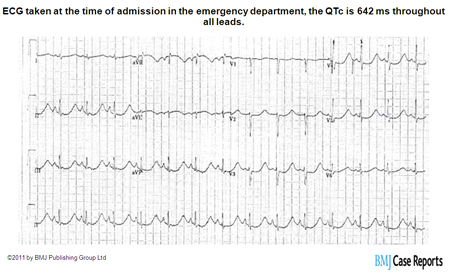Tests
1st tests to order
serum electrolytes
Test
Hypokalemia may be accompanied by other electrolyte disorders for which there are no ready explanations.
Elevated serum bicarbonate in bulimia nervosa usually indicates an alkalosis due to emesis of gastric acid, but electrolytes must be combined with ABG measurement to definitively diagnose an acid-base abnormality.
Result
may show hypokalemia or alkalosis
serum creatinine
Test
May reflect azotemia due to volume depletion.
Result
may be elevated
serum magnesium
Test
Total body magnesium depletion frequently occurs with normal serum magnesium levels. If serum magnesium is low, the total body levels are always low.
Serum magnesium should be ordered separately from serum electrolytes.
Result
may be low
urine pregnancy test
Test
The possibility of pregnancy should always be considered with a change in symptoms.
Result
may be positive
serum LFTs
Test
Drug overdose, alcohol ingestion, or excess exercise may elevate aminotransferases.
Result
may be abnormal
serum creatine kinase (CK)
Test
Drug overdose, alcohol ingestion, or excess exercise may elevate CK.
Result
may be high
CBC
Test
Patients may self-phlebotomize as a form of purging, but rarely give this history. Anemia and the presence of needle marks may be the only clues.[79]
Result
may show low hemoglobin
urinalysis
Test
Patients with comorbid diabetes mellitus may have poor glycemic control. Some patients may skip insulin to control their weight.
Result
may show ketones
Tests to consider
ECG
Test
If there is a deficiency of potassium or magnesium, or a history of anorexia nervosa, there can be a prolonged QTc interval or arrhythmias.[80][81][Figure caption and citation for the preceding image starts]: Prolonged QT interval in a patient with 3 episodes of collapse and a history suggestive of bulimia nervosaAdapted from Buchanan R et al. BMJ Case Reports 2011 (doi:10.1136/bcr.01.2011.3780); used with permission [Citation ends].
If the QTc is >440 milliseconds, or if rhythm or conduction is abnormal, urgent evaluation is required.
Result
may be abnormal
serum ferritin
Test
To evaluate presenting symptoms such as menstrual irregularity or abdominal symptoms. Ferritin may be low, reflecting low iron levels.
Result
may be low
serum B12
Test
Nutritional deficiencies including B12 (or, rarely, thiamine, niacin, copper, and riboflavin) may be present. Bulimia should be considered in a young woman who presents with such a deficiency.
Result
may be low
serum red blood cell folate
Test
May be seen in nutritional folate deficiency.
Result
may be low
dual-energy x-ray absorptiometry scan for bone density
Test
Commonly normal unless there is a prior history of anorexia nervosa. Bone density is often decreased in anorexia nervosa. Low bone density correlates with low total body fat and amenorrhea, neither of which is common in bulimia nervosa. It is not a differentiating test.
Result
usually normal
Use of this content is subject to our disclaimer